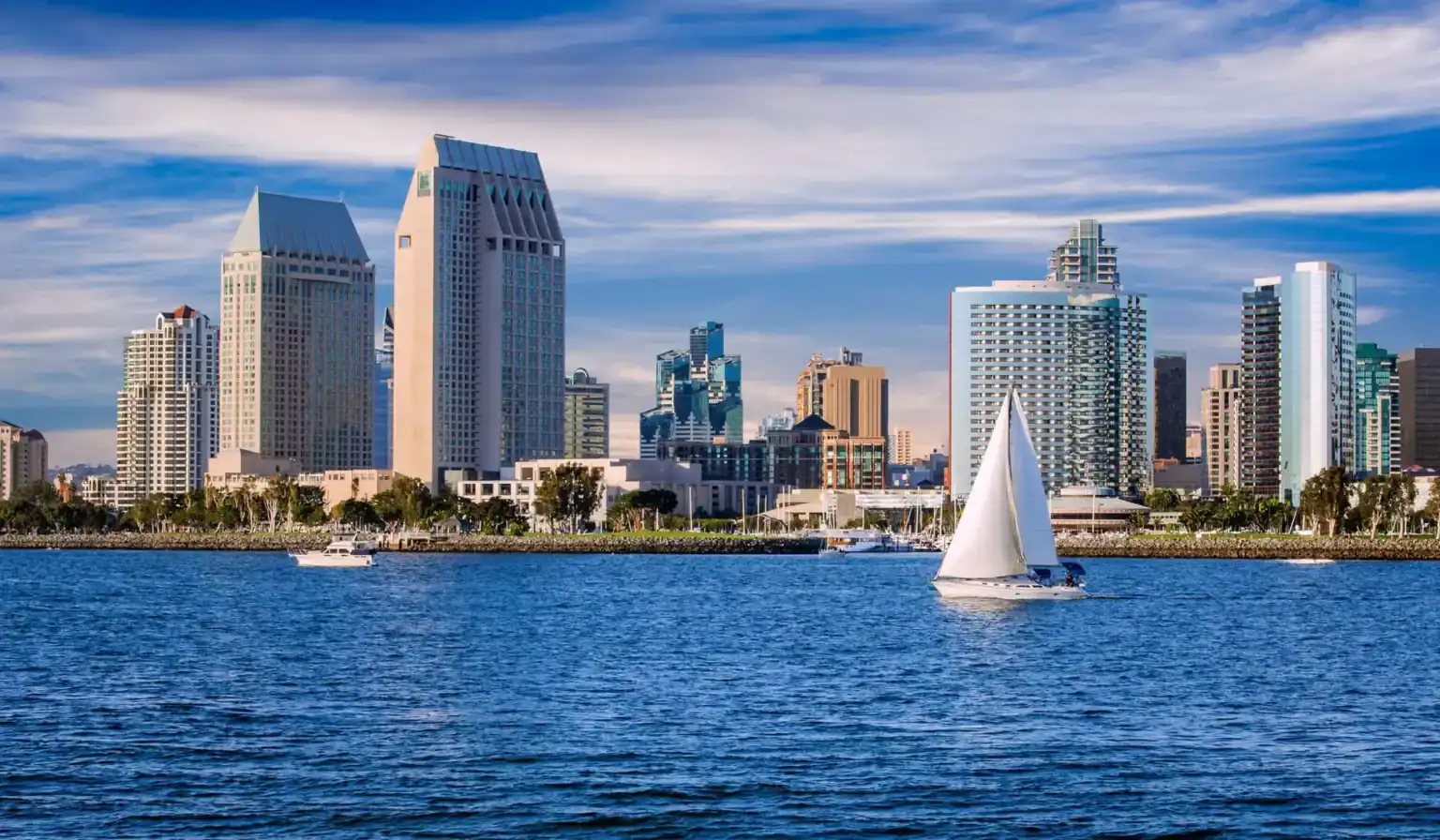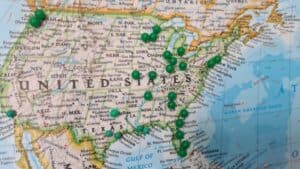
Is CBD Legal in San Diego, CA
Yes, CBD products are legal in San Diego, CA
 Legal
Legal
Assembly Bill 45 in California made it legal to buy and sell CBD products in California.
CBD, or cannabidiol is a compound derived from the cannabis plant. CBD has the potential to offer therapeutic benefits without psychoactive effects. It has shown promise in alleviating pain, reducing anxiety, and improving the quality of sleep. Research into CBD is still ongoing, but it has shown effectiveness in treating a variety of ailments. Before buying CBD in California, make sure to check the lab test results for each product to ensure that they are labeled accurately.
In California, you must be at least 18 years old to purchase CBD products.
While THC is detectable in the blood for 5 hours after use, CBD can stay in the blood for 7 days. CBD can be found in the saliva for 24 to 36 hours after use.
CBD oil is derived from cannabidiol, the non-psychoactive part of the cannabis plant. It is in a concentrated form and can be taken sublingually.
The World Health Organization has reported that CBD is not addictive, stating "In humans, CBD exhibits no effects indicative of any abuse or dependence potential". So far, there has been no evidence that pure CBD can lead to addiction.
CBD is generally considered to not be lethal. While there aren't many studies done on the toxic levels of CBD, the "toxic" dose is believed to be around 20,000 mg of CBD, taken at one time. A toxic dose is not considered to be lethal, but for ethical reasons dosages this high have not been studied in humans.
Moderate evidence has shown that CBD can help with sleep disorders, fibromyalgia pain, and muscle spasticity. However, CBD has the potential to cause side effects such as dry mouth, diarrhea, and fatigue. Each individual must assess the risks and benefits carefully.
Moderate evidence has shown that CBD can help with sleep disorders, fibromyalgia pain, and muscle spasticity. However, CBD has the potential to cause side effects such as dry mouth, diarrhea, and fatigue. Each individual must assess the risks and benefits carefully.
Is THC Legal in San Diego, CA
Yes, THC products are legal in San Diego, CA
 Legal
Legal
To buy THC products in California, you must be at least 21 years old for recreational use. Adults aged 21 and older can legally purchase marijuana products, including those containing THC, from licensed dispensaries.
For medical marijuana, individuals can access THC products if they are at least 18 years old and possess a valid medical marijuana card issued by the state. Minors under 18 can also qualify for medical marijuana, but they must have a designated caregiver—usually a parent or legal guardian—who can apply for the medical card and purchase the products on their behalf.
Yes, THC products in California are required to undergo third-party testing. The state has established stringent regulations to ensure the safety, quality, and potency of marijuana products sold in licensed dispensaries. All cannabis products must be tested by independent laboratories that are accredited by the California Bureau of Cannabis Control (BCC).
These tests evaluate various factors, including the potency of THC and CBD, as well as the presence of contaminants such as pesticides, heavy metals, molds, and residual solvents. This rigorous testing process helps ensure that consumers receive safe and accurately labeled products. In addition to testing, all cannabis products must include detailed labeling that provides information on the contents, dosage, and any potential allergens. This commitment to quality and transparency helps protect consumers and maintains high standards within California’s cannabis market.
Yes, THC products in California are required to undergo third-party testing. The state has established stringent regulations to ensure the safety, quality, and potency of marijuana products sold in licensed dispensaries. All cannabis products must be tested by independent laboratories that are accredited by the California Bureau of Cannabis Control (BCC).
These tests evaluate various factors, including the potency of THC and CBD, as well as the presence of contaminants such as pesticides, heavy metals, molds, and residual solvents. This rigorous testing process helps ensure that consumers receive safe and accurately labeled products. In addition to testing, all cannabis products must include detailed labeling that provides information on the contents, dosage, and any potential allergens. This commitment to quality and transparency helps protect consumers and maintains high standards within California’s cannabis market.
Is Delta-8 Legal in San Diego, CA
Yes, Delta-8 products are legal in San Diego, CA
 Legal
Legal
Delta-8 THC is either illegal or regulated in California, the laws are not 100% clear. Despite this, people report being able to buy delta-8 products in smoke shops; Delta-8 tetrahydrocannabinol (Delta-8 THC) is a cannabinoid found in the cannabis plant, known for its psychoactive effects, although they are generally milder compared to the more well-known Delta-9 THC. The debate over Delta-8 largely centers on its legal status, potential health risks, and production methods. Despite being derived from hemp, legalized in the United States via the 2018 Farm Bill, the extraction and conversion processes have come under regulatory scrutiny. Critics argue that these methods could lead to impurities and safety issues. Moreover, concerns exist regarding its impact, particularly when consumed by vulnerable groups such as minors, given that Delta-8 products are often promoted as a legal and less potent alternative to traditional marijuana. Consequently, the regulatory environment and public perception surrounding Delta-8 THC remain intricate and contentious.
Delta-8 THC is either illegal or regulated in California, the laws are not 100% clear. Despite this, people report being able to buy delta-8 products in smoke shops; Delta-8 tetrahydrocannabinol (Delta-8 THC) is a cannabinoid found in the cannabis plant, known for its psychoactive effects, although they are generally milder compared to the more well-known Delta-9 THC. The debate over Delta-8 largely centers on its legal status, potential health risks, and production methods. Despite being derived from hemp, legalized in the United States via the 2018 Farm Bill, the extraction and conversion processes have come under regulatory scrutiny. Critics argue that these methods could lead to impurities and safety issues. Moreover, concerns exist regarding its impact, particularly when consumed by vulnerable groups such as minors, given that Delta-8 products are often promoted as a legal and less potent alternative to traditional marijuana. Consequently, the regulatory environment and public perception surrounding Delta-8 THC remain intricate and contentious.
Though Delta-8 is considered less potent than Delta-9 THC, it possesses psychoactive effects, warranting responsible usage. If you have pre-existing medical conditions or are on medications, it is prudent to consult a healthcare professional before incorporating Delta-8.
Delta-8 THC operates on the body by linking with the CB1 receptors of the endocannabinoid system, mainly found in the central nervous system. This interaction triggers psychoactive effects, typically milder than those associated with Delta-9 THC. Users often express sensations of relaxation, euphoria, and altered sensory perception. Delta-8 may also prompt an upswing in appetite, dry mouth, and red eyes. However, its effects can exhibit significant variation from person to person, contingent on factors such as dosage, tolerance, and an individual's distinct sensitivity to cannabinoids.
Delta-8 THC is either illegal or regulated in California. The state passed Bill AB-45 in October 2021, which added Delta-8 to the definition of THC and also made it illegal to sell hemp products with more than 0.3% of any kind of THC. But despite this, I’ve heard reports that you can still easily buy Delta-8 products in local smoke shops, so it doesn’t look like the bill is being enforced.
Delta-8 THC and Delta-9 THC possess analogous chemical structures, though Delta-8 is renowned for its lower potency and its tendency to produce a gentler, more clear-headed high. Many users opt for it as a more functional option.
Delta-8 THC is offered in various configurations, including edibles, vape cartridges, tinctures, and capsules. The selection of how to consume it is subjective and based on individual preferences and the desired effects.
Ongoing discussions and research focus on the safety of Delta-8 THC. While it's generally considered to have less potency and produce milder psychoactive effects than Delta-9 THC, concerns arise regarding potential impurities that may result from its manufacturing techniques. Moreover, like any psychoactive substance, its safety can be influenced by an individual's health, patterns of use, and dosage. To reach a conclusive assessment of its safety, more comprehensive scientific studies are necessary, and caution is advised, especially in the absence of clear regulatory guidelines.
Frequently observed side effects may involve dry mouth, red eyes, heightened heart rate, and short-term memory lapses. Generally, these reactions are less severe than those associated with Delta-9 THC.
Affirmative, Delta-8 THC can potentially produce a positive result on a drug test, given that many tests lack the ability to differentiate between Delta-8 and Delta-9 THC. If drug testing is a consideration, using Delta-8 products should be approached with caution.
Depending on where you are, your capacity to buy Delta-8 products might be influenced by age restrictions, which usually establish a minimum age of either 18 or 21. To ensure legal adherence, make sure to familiarize yourself with your local age requirements through thorough research on local regulations.
Delta-8 products are accessible through a multitude of channels, ranging from licensed dispensaries to online retailers and certain convenience stores. Prior to purchasing, it's essential to thoroughly investigate the legality of Delta-8 in your area and select a reputable seller committed to both product quality and adherence to local regulations.
Is Delta-9 Legal in San Diego, CA
Yes, Delta-9 products are legal in San Diego, CA
 Legal
Legal
In California, you need to be at least 21 years old to buy Delta-9 THC products. This age requirement aligns with the state’s regulations for recreational marijuana use, established under Proposition 64.
Yes, it is legal to smoke Delta-9 THC flower in California. The state legalized recreational marijuana for adults aged 21 and older through Proposition 64, which allows individuals to possess and use marijuana products, including Delta-9 THC flower, within specified limits.
Yes, Delta-9 THC products are required to undergo third-party testing. These tests ensure that the products meet quality standards, comply with federal guidelines (including containing less than 0.3% Delta-9 THC), and are free from contaminants such as pesticides, heavy metals, and residual solvents, ensuring that Delta-9 products are safe, accurately labeled, and meet quality standards before reaching consumers.
In any case, it is always recommended that you take the time to review these lab reports to ensure product safety and potency, regardless of legal requirements.
Is HHC Legal in San Diego, CA
Yes, HHC products are legal in San Diego, CA
 Legal
Legal
In California, the age requirement for purchasing HHC (Hexahydrocannabinol) varies based on the type of product. For hemp-derived HHC, you must be at least 18 years old to buy these products, which are available at convenience stores, vape shops, and online retailers.
On the other hand, if HHC is derived from marijuana, you need to be at least 21 years old to purchase it from licensed cannabis dispensaries. This is in line with the regulations for recreational marijuana sales in the state.
Regardless of the product type, it’s important to confirm the specific regulations and retailer requirements to ensure compliance with local laws.
Yes, smoking hemp-derived HHC (Hexahydrocannabinol) flower is legal in California. The state allows the use of hemp-derived cannabinoids like HHC, provided they meet federal regulations, including maintaining a THC concentration of less than 0.3%.
Yes, in California, hemp-derived HHC products must undergo third-party testing. This testing is crucial to ensure the products adhere to state quality standards and federal regulations, such as maintaining a THC concentration below 0.3%. Third-party testing confirms the safety, potency, and purity of HHC products, ensuring they are free from contaminants and accurately labeled.
Remember that reliable manufacturers and retailers often provide certificates of analysis (COAs) from independent labs to show that their products have been tested and meet the necessary standards. Although California’s state regulations might not require third-party testing for all hemp-derived products, we suggest you buy from reputable sources.
Disclaimer
This information is derived from our independent research. Our team aims to ensure that we give you accurate up-to-date details from reliable state-run sources. However, we are not legal experts, and local laws can be subject to change.





































